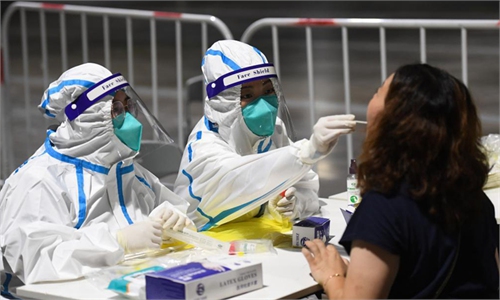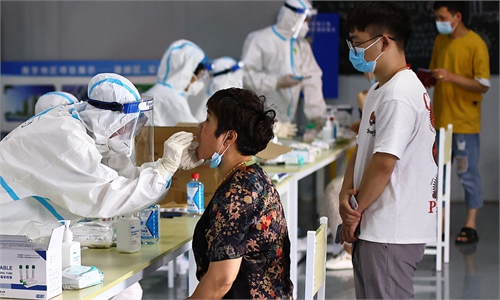New coronavirus outbreak poses economic challenges, recovery to remain intact
Anti-virus efforts to exert pressure, but economy to remain robust

Photo taken with a drone on July 27, 2021 shows temporary laboratories for nucleic acid testing at Nanjing Youth Olympic Games Sports Park in Nanjing, east China's Jiangsu Province.(Photo: Xinhua)
A new wave of COVID-19 infections in numerous places across China has prompted swift anti-virus efforts by officials, including shutting down tourist attractions and imposing travel restrictions, raising concerns over potentially profound disruptions to China's hard-won, robust economic recovery in the second half of the year.
Given the seriousness of the new outbreaks sparked by the much more transmissible Delta variant and the strict anti-virus efforts across the country, including economic powerhouses in the east and south of the country, many industries and businesses, including tourism, travel and entertainment, could be affected, analysts said on Tuesday.
However, the analysts predicted that the new wave will likely be reined in relatively quickly, and the overall robust economic recovery will remain intact, citing China's experience in fending off new outbreaks, solid economic fundamentals and many policy tools to cushion any potential adverse impact.
Full-year GDP growth is still expected to exceed 8 percent, way above the official target of above 6 percent, they noted.
The new outbreaks, which started in Nanjing, East China's Jiangsu Province, and have since spread to numerous cities across the country, including Beijing, has been described as the most serious since last year's outbreak in Wuhan, Central China's Hubei Province.
On Tuesday, China reported a total of 61 new local cases for Monday, including 45 cases in Jiangsu Province and one in Beijing.
The response has been swift. As of Tuesday, almost all Chinese provinces, municipalities and regions had taken anti-virus measures. In Beijing, after strict restrictions on non-essential travel and on traffic at tourist attractions, catering businesses such as café bars have been closed, according to online reports on Tuesday. Jiangsu on Tuesday suspended taxi services and domestic air travel in and out of Nanjing and Yangzhou. In Central China's Hunan Province, all tourist spots in the famous city of Zhangjiajie have been shut down.
The outbreaks and subsequent anti-virus efforts will likely affect certain industries and businesses that are directly involved, including tourist attractions, major entertainment activities, catering, lodging, airlines and travel agencies, according to Jiang Yiyi, deputy head of the School of Leisure Sports and Tourism under the Beijing Sport University.
"There were high expectations for summer time travel but the virus flare-up could mean the goal for a full recovery in the [tourism sector] would be delayed," Jiang told the Global Times on Tuesday.
The tourism sector and related businesses such as travel, catering, lodging and entertainment have been among the hardest hit and are also the most vulnerable in the new outbreak. In contrast to rapid recoveries in other sectors, China's tourism sector remains under pressure. In the first half of the year, domestic trips stood at around 1.9 billion, up 100.8 percent year-on-year - but only 60.9 percent of the pre-pandemic level in 2019.
Given the rising role of the domestic services sector in overall economic growth, some are raising concerns over the impact of the new outbreak on China's economic recovery. Some foreign media outlets even predicted that China's GDP growth could slow down significantly in the second half of 2021.
However, the impact is so far limited to only certain businesses in certain areas, and the overall nationwide recovery process, including in those sectors, won't be derailed, analysts said.
"The loss of the tourism sector in these areas is now under control," said Jiang, adding that once the new outbreaks are reined in, the recovery will get back to the fast track.
The new outbreaks have hit some of China's economic powerhouses, including Guangdong, Jiangsu and Shandong - the top three provincial-level economies in the country. While the new outbreak may cause disruptions to certain businesses, those areas are also best-positioned to fight the spread and shake off impact. The local GDP of those three provinces grew faster than the national growth pace of 12.7 percent in the first half of the year.
For the national economic recovery during the rest of the year, the new outbreaks, while posing certain uncertainties, won't derail the overall recovery, as the country is well-prepared for potential risks and challenges, analysts said.
Tian Yun, former vice director of the Beijing Economic Operation Association, said that if the virus continues to spread, the impact could be severe, especially on the services sector, but the uncertainty posed by the pandemic was also taken into account in setting China's social and economic development goals with a "cautious" attitude.
Despite rapid growth in the first half of the year, China has set a relatively lower growth target for the year: above 6 percent. In spite of the new outbreaks, China's GDP growth is widely expected to exceed 8 percent in 2021. The IMF, for instance, projected China's GDP to grow 8.1 percent in the year.
Apart from China's experience and capability in curbing new outbreaks, analysts cited the nation's preparedness and sufficient policy tools to cope with potential economic challenges.
A meeting of the Political Bureau of the Communist Party of China Central Committee on Friday stressed that the domestic economic recovery is still not firm and unbalanced and called for "consistent, stable and sustainable macro policies" to keep the economy within an appropriate range, according to Xinhua.




